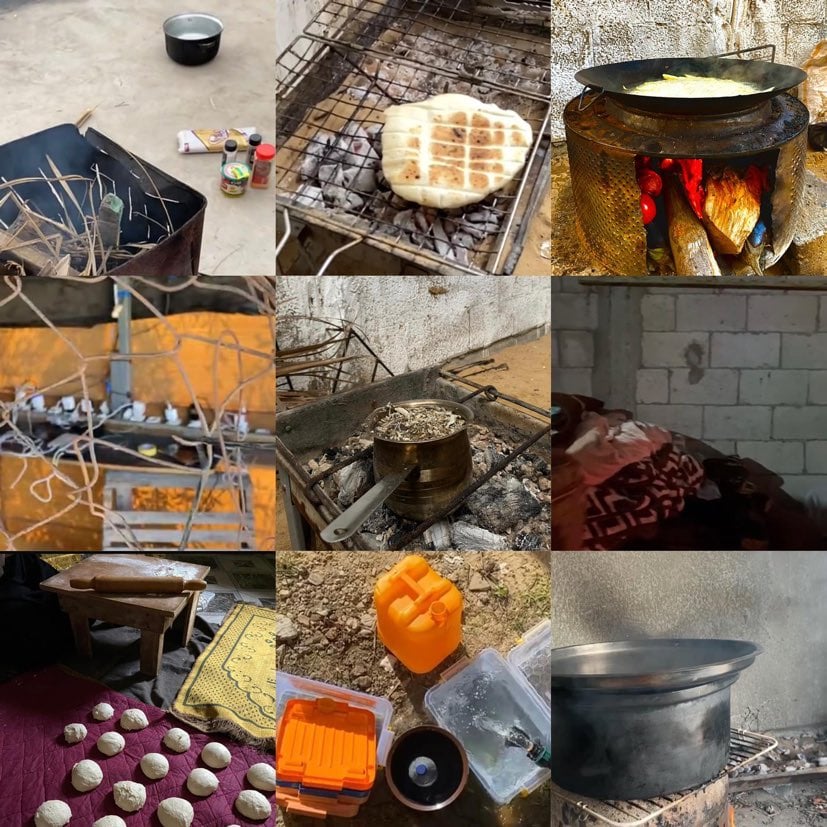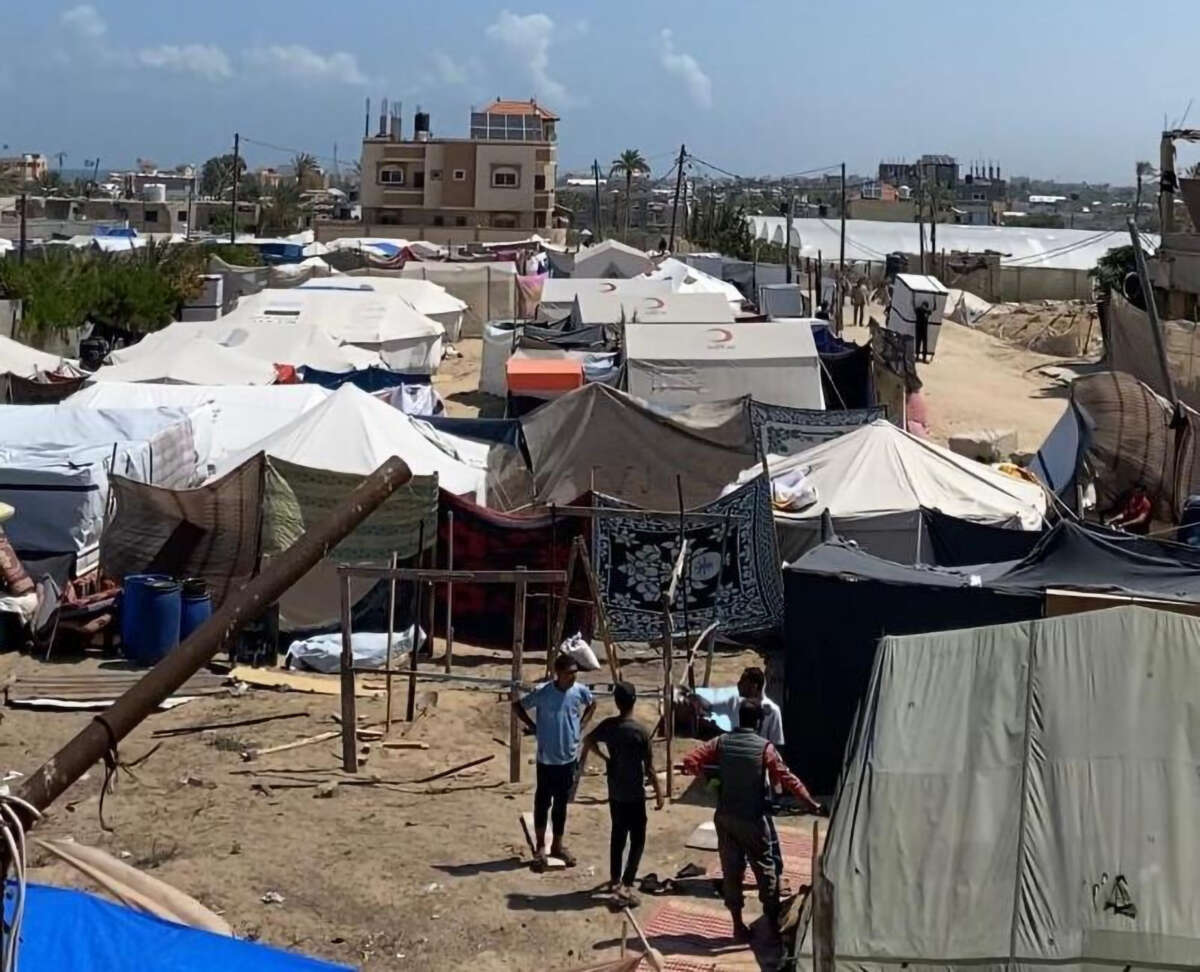Part of the Series
Struggle and Solidarity: Writing Toward Palestinian Liberation
Support justice-driven, accurate and transparent news — make a quick donation to Truthout today!
“We are waiting for you to arrive tomorrow!” my sister told me in our call on Saturday, October 6, 2023. It was midnight, the perfect ending to a beautiful and calm day. “We will spend such an enjoyable weekend together.”
Then it was 6 am October 7, and my life turned into an indescribable nightmare.
Rockets whistled everywhere, and no one understood why. Crying and trembling with fear, I rushed to pack my personal documents in a small bag. That’s what all Gazans do when an attack starts. We’ve lived through so many. What we didn’t know, however, was that this would be the most cruel and brutal war ever launched on the Gaza Strip.
“Please take care of yourself and your baby, Aya. Stay calm as much as you can,” Mom called out to me. My husband Mohammed added: “Fear threatens your baby and yourself, Aya. You have to help me, yourself and the baby, and stay as stable as possible.”
It was 10 am when Mohammed and I left our house where we had been preparing to celebrate our first wedding anniversary, on October 14. And since that moment, I haven’t felt safe.
During the first week of the war, we were displaced three times. Just a day before our anniversary, the Israeli army warned everyone living in the north of the Gaza Strip to evacuate. I trembled for an hour after receiving that order, negative thoughts flooding my mind. I don’t want to lose my baby, I thought. I don’t want to lose my family. It could be the end!

I couldn’t control the fear coursing through my veins, so I told Mohammed I wanted to flee to the south immediately. It was a scene that reminded me of my grandparents’ Nakba tales.
Long hours passed as we looked for shelter, with no particular destination in mind. I was exhausted and I could barely take a deep breath. Before sunset, we were lucky enough to find a house in Rafah where we could stay — along with 50 others.
Weeks passed with no bedrooms, no privacy, no clean water, no healthy food. These are harsh conditions anytime, but when you’re pregnant, the impacts are multiplied. I became sick with the flu, coughing and vomiting all the time. The doctors were busy with much more urgent matters, and I kept praying to Allah to keep my baby safe.
Three months passed, a blur of fatigue, illness, fear, overthinking, and crying day and night. “Where and how will I deliver my baby?” This was my daily question, with no answer. Most hospitals were out of service and how would I reach one anyway, with bombing and Israeli tanks everywhere?

Second row: 1) When you discover a tent with a solar panel or battery, everyone rushes to charge their mobile phones. The tent owner charges one to two Israeli shekels (25-50 cents) for each phone. 2) Boiling water over coal to make tea or coffee. 3) An old storage shed we lived in when we had to evacuate Rafah suddenly.
Third row: 1) Part of our daily routine is baking bread; this is the bread dough. 2) We use empty plastic crates and buckets to hold water for cleaning and bathroom use. We collect water by waiting our turn with many others at community spigots. 3) Heating water for a shower.
On January 13, shortly after midnight, I woke up with sharp pains that lasted until the crack of dawn. Deciding we could wait no longer, Mohammed rushed out to the street, where he begged anyone with a car to drive us to the hospital. He offered to pay whatever was demanded. It was half an hour before he found someone; fuel is in short supply. Then, it was a two-hour drive. I remember very little of that journey.
Fortunately, a doctor examined me as soon as we arrived. “Aya, you are in danger; if we don’t take action, you will lose your baby and you will be in danger, too. We must do a caesarean section in three days,” he told me.
I couldn’t reach my mother, who lives on the other side of Rafah city. There was no internet connection, and my phone calls dropped. But my mom sensed something was wrong and sent my father to find me. When she heard I would have surgery soon, she came running to the hospital.
I had long fantasized about the birth of my first child; it was a joy I eagerly anticipated. But everything about this birth was terrifying: Israeli tanks thundered nearby, and people around me were crying out in pain. Medications of any kind, including anesthesia, were in short supply. Would I survive this ordeal and see my baby?
Fortunately, spinal anesthesia was still available, unlike for many other women in Gaza. But it seemed weak. The pain was so strong I could barely breathe. There was a moment when I thought I might die.
And then I heard his cry. My baby, Kareem! It was a moment of mixed emotions: I was intensely relieved and happy, while also terrified to be the mother of a newborn during war. Could I keep him healthy? Malnutrition is rampant in Gaza, since the Israeli government blocks imports of aid.
I stayed in the hospital for one night. In the morning, I had to leave, despite my continuing pain. All they gave me was a discharge paper saying I had delivered a baby boy by Cesarean section. That’s all. No birth certificate and no ID for my little Kareem.
Kareem is now growing up in the midst of a vicious war; he turned 8 months old in the south of Gaza, far from his house and the room that was to be his nursery. I cannot give him an innocent childhood, but I pray to Allah to keep him alive and in good health. And I will assure he knows he is loved.
This war will end, but what will his future hold? Only Allah knows.
Note: A correction has been made to fix the spelling of the author’s name.
Press freedom is under attack
As Trump cracks down on political speech, independent media is increasingly necessary.
Truthout produces reporting you won’t see in the mainstream: journalism from the frontlines of global conflict, interviews with grassroots movement leaders, high-quality legal analysis and more.
Our work is possible thanks to reader support. Help Truthout catalyze change and social justice — make a tax-deductible monthly or one-time donation today.
